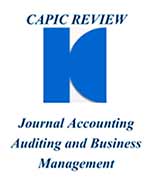Evaluation of the perceptions of public accountant students on their learning of professional services
Published 2021-10-26
Keywords
- public accountant,
- case study,
- pandemic,
- professional service
How to Cite
Abstract
The global health crisis forced educational institutions to adapt the traditional face-to-face teaching format to move to an absolutely digital format, requiring the students and teaching teams to adopt permanent tools that until this year were of occasional use. In this context, the work seeks to know the perception of a group of students about their own training process, in a context of virtual education, in the matter of Professional Practice of the Public Accountant career of the Faculty of Economic Sciences of UNICEN.
The study, of a qualitative explanatory nature, includes a case study. A particular survey was carried out with a sample of 51 students. Additionally, work was carried out on document analysis, complementing interviews with 3 teachers of the subject and observing the activities of the students on the Unicen Virtual platform.
Average was worked on each of the measured variables, grouped into 5 dimensions: Objectives, Content, Planning, Didactic Resources and Student Vision. In general, all the dimensions studied reached important evaluations, taking into account the scales from 1 to 7, the general average being 5.70.
The opinions of the students indicate that the path taken in the face of the emergency was the correct one. There is no doubt that the crisis has been a natural experiment that allowed us to adopt different forms of relationship with students, typical of the new generations and highly valued by them.
Downloads
References
- Alfonso Sánchez, Ileana R. (2003). La educación a distancia. ACIMED, 11(1), 3-4.
- Almanza Jiménez, R. y Vargas Hernández, J. (2015). Las Competencias Profesionales y su relación con la empleabilidad de los Ingenieros en Gestión Empresarial egresados del ITLAC. Revista Gestión de las Personas y Tecnología. Edición nº 22. Mayo 2015. USACH.
- Sanchez Abrego, D. y Richón, E. (2018) Políticas de impacto en el Balance Social y el rol del Contador Público. Un estudio de caso. Contabilidad y Auditoría. Nº 48 - año 24 - Pp 121-160.
- Betancourth, S. (2015). Desarrollo del pensamiento crítico en docentes universitarios. Una mirada cualitativa. Revista Virtual Universidad Católica del Norte, (44), 238-252.
- Brammer, S. y Clark, T. (2020). COVID-19 and Management Education: Reflections on Challenges, Opportunities, and Potential Futures. British Journal of Manag., Vol. 31, 453–456
- Burgess, S. y Sievertsen, H. (2020). Schools, skills, and learning: The impact of COVID-19 on education. Vox-Eu. Research-based policy analysis and commentary from leading economists. Eisenhardt, K. (1989). Building Theories from Case Study Research. The Academy of Management Review, Vol. 14, No. 4. (Oct., 1989), pp. 532-550.
- Evans, G., e Hidalgo, R. (2020). Analytics for Action: Assessing effectiveness and impact of data informed interventions on online modules. RIED. Revista Iberoamericana de Educación a Distancia, 23(2), pp. 103-125.
- García Aretio, L. (2017). Educación a distancia y virtual: calidad, disrupción, aprendizajes adaptativo y móvil. RIED. vol. 20, (2), pp. 9-25.
- García-Peñalvo, F. J., Corell, A., Abella-García, V., & Grande, M. (2020). La evaluación online en la educación superior en tiempos de la COVID-19. Education in the Knowledge Soc., 21, 12.
- Halpern, D. F. (1998). Teaching critical thinking for transfer across domains - Dispositions, skills, structure training, and metacognitive monitoring. American Psychologist, 53 (4), 449-455.
- Hilgenberg, C y Tolone, W. (2000). Student perceptions of satisfaction and opportunities for critical thinking in distance education. American Journal of Distance Education, 14:3, 59-73.
- IFAC (2008). Manual de Pronunciamientos Internacionales de Formación. IES nº 1 a 8. Consejo de Normas Internacionales de Formación en Contaduría, IFAC.
- Lim, J. y Richardson, J. (2016). Exploring the effects of students' social networking experience on social presence and perceptions of using SNSs for educational purposes. The Internet and Higher Education. Vol 29, April 2016, Pages 31-39.
- Lion, C. y Maggio, M. (2019). Desafíos para la enseñanza universitaria en los escenarios digitales contemporáneos: Aportes desde la investigación. Cuadernos de Investigación Educativa, Vol. 10, Nº 1, 2019, Montevideo (Uruguay), 13-25. Universidad ORT Uruguay. ISSN 1510-2432.
- Maldonado, G., García, J., y Sampedro-Requena, B. (2019). El efecto de las TIC y redes sociales en estudiantes universitarios. RIED. Vol. 22(2), pp. 153-176.
- Silva, J. (2017). Un modelo pedagógico virtual centrado en las E-actividades. RIED, vol. 53.


































